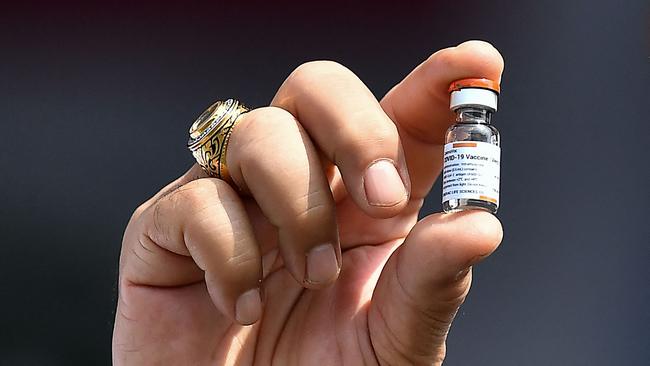Asian sceptics reject Chinese Sinovac COVID-19 vaccine
China’s vaccine diplomacy is facing hurdles across Southeast Asia, with The Philippines drug authority ruling Sinovac was not effective enough for health workers.

China’s vaccine diplomacy is facing hurdles across Southeast Asia, with The Philippines drug authority ruling Sinovac was not effective enough for health workers while two separate Indonesian surveys have found more than 40 per cent of respondents did not want the vaccine.
Indonesia has already begun vaccinating health and essential workers with the Chinese-developed Sinovac drug, while The Philippines Food and Drug Agency approved the COVID-19 vaccination for emergency use this week.
But The Philippines’ agency said it would not allow the country’s 1.4 million medical frontline workers to receive it. “According to our experts, (Sinovac’s) vaccine is not the best vaccine for them,” Philippines FDA chief Rolando Enrique Domingo said this week, citing widely varying results of late-stage clinical trials of Sinovac’s CoronaVac in Brazil, Turkey and Indonesia of 50.4 per cent, 91.25 per cent and 65.3 per cent respectively.
Beijing has said it expects to provide vaccines to 53 countries, as many developing nations struggle to secure enough doses for their populations.
Thailand was the latest country to receive the vaccine on Wednesday when Prime Minister Prayuth Chan o-cha greeted the first 200,000 doses at Bangkok airport
But not everyone is comfortable with the opaque nature of China’s COVID-19 vaccine development process.
Chinese pharmaceutical developers Sinopharm and Sinovac have not published phase three trial data in peer-reviewed medical journals, leaving millions of people to decide on whether to take the vaccine with only scant information on its potential side effects and efficacy among different age groups.
The Philippines government defended its procurement of 600,000 Sinovac doses this week as it faces delays in the delivery of Pfizer and AstraZeneca vaccines because of liability concerns.
But on Tuesday it also offered to lift the cap on the number of Filippino nurses allowed to take up jobs in Britain and Germany in exchange for vaccine donations from those governments.
While The Philippines has Southeast Asia’s second highest rate of infections, with 564,865 cases nationwide, Indonesia is by far the worst-affected country in the region with more than 1.3 million cases and 35,000 deaths.
Indonesia began inoculating frontline health workers with Sinovac last month, and is now rolling out the second stage of its national vaccination program to 21 million elderly recipients and 17 million essential workers.
Sinovac forms the backbone of a national vaccination campaign that aims to inoculate 180 million people by the end of the year, and the government has warned welfare recipients who refuse the vaccine could lose their payments.
Still, two new surveys have exposed surprisingly high levels of distrust in the vaccine. A January survey by the Jakarta-based Centre for Strategic and International Studies found 42.5 per cent of respondents in the national capital Jakarta said they strongly or moderately distrusted the efficacy of COVID-19 vaccines and 40 per cent said they did not want the vaccination.
A second survey this month by another independent pollster, Indikator, found 41 per cent of those surveyed were unwilling to be vaccinated, with more than half citing fears of side effects and 27 per cent concerned the vaccine was ineffective.
Both polls coincided with record levels of daily infections and deaths in Indonesia, and particularly in Jakarta where hospitals have been pushed to the limits of their capacity since early January.
CSIS researcher Noory Oktha said that while his survey did not specifically ask about Sinovac, Indonesia’s reliance on the Chinese vaccine has been widely reported.
“I think it’s quite safe to assume that one of the reasons why people express concern about this vaccine issue is because they know that the efficacy of the Sinovac vaccine is quite low compared to other vaccines like Pfizer,” Mr Noory said.
As with survey results globally, Mr Noory said young Indonesian women of child-bearing age were among the most sceptical of COVID-19 vaccination, which was “understandable” due to the lack of reliable data on the effect of COVID-19 vaccines on pregnant women or nursing mothers.
Older Indonesians tended to be more willing to be vaccinated, notwithstanding scant data on Sinovac’s effect on the elderly, and the fact it is not yet being rolled out in China for people over 60.




To join the conversation, please log in. Don't have an account? Register
Join the conversation, you are commenting as Logout